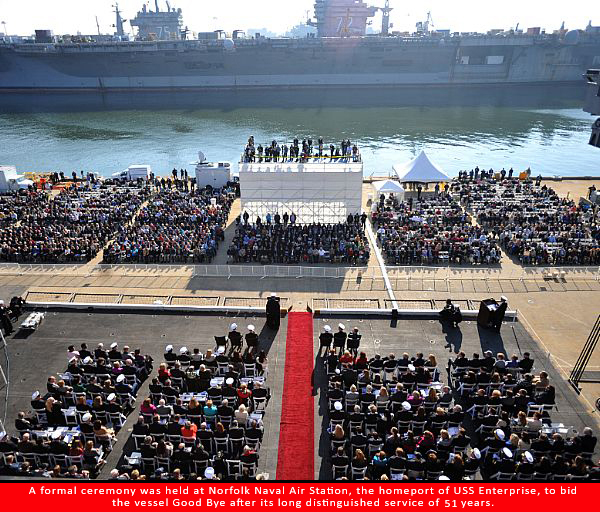|
Commissioned on November 25, 1961, and the eighth
ship to bear the name Enterprise, the "Big
E" was also the world's first nuclear-powered
aircraft carrier. It was retired after completing
25 deployments beginning in the Cold War at the
height of the US-Soviet tension over the Cuban
missile crisis in 1962.
The last major deployment for the carrier, numbered
CVN 65, was in May 2011 when its onboard F 18
Super Hornet aircraft gave a protective shield
to the US Navy SEALS who raided Islamabad’s
military city of Abbotabad in helicopters to kill
terror leader Osama bin Laden. The US had deployed
three aircraft carriers in the Arabian Sea for
the operation, apparently as a backup measure
just in case the Pakistani Army did something
to attack the commandos, or more.
The other two aircraft carriers were Carl Vinson
and Ronald Reagan.
Incidentally, the carrier deployment for the
mission, codenamed Neptune Spear, was first acknowledged
by Defence Secretary Leon Panetta a year later
while responding to a question at the Institute
for Defence Studies and Analyses in New Delhi
in June 2012. http://www.indiastrategic.in/topstories1582_Six_US_Aircraft_Carriers_for_Asia_Pacific.htm
).
As per the naval traditions, ships live on. The
name accordingly has been passed on to a newer
generation aircraft carrier under construction.
The first vessel in the series is named after
late President Gerald Ford (CVN 78), and due to
enter service in 2015. It will be followed by
John F Kennedy (CVN 79), and then Enterprise (CVN
80).
According to a US Navy statement, Secretary of
the Navy Ray Mabus, in a video message played
at the ceremony, announced that the name Enterprise
will live on as it was officially passed to CVN-80,
the third Ford class carrier.
The non-nuclear, oil-powered John F Kennedy carrier
(CV 67) was retired in 2007. It was in fact informally
offered to India but not taken due to high fuel
costs and lack of naval aircraft in appropriate
numbers with the Indian Navy any way.

It may be recalled that the Enterprise was also
deployed in 1971 during the Bangladesh Liberation
War to deter India from taking action against
the Pakistani forces whose massacre and repression
of the then East Pakistanis led to an exodus of
more than 10 million people into India. There was
no hostile action against India though.
Enterprise saw action in Vietnam, in both the
Gulf Wars against Iraq, and became the first ship
to launch strikes against terrorists and Taliban
forces in Afghanistan after the 9/11 terror attacks
on the US in 2001.
“On September 11, 2001, Enterprise aborted
her transit home from a long deployment after
the terrorist attacks, and steamed overnight to
the North Arabian Sea. Big 'E' once again took
her place in history when she launched the first
strikes in direct support of Operation Enduring
Freedom,” the Navy statement observed.
Significantly, the ship is only being inactivated for the time being, and not
decommissioned. That means if required, Enterprise can be stocked and replenished
at short notice for an emergency.
Panetta had said that the US will keep an 11-carrier navy, six of which will be
deployed in the Asia Pacific region.
With its inactivation, the number has come down to 10, and should stay so until 2015.
|